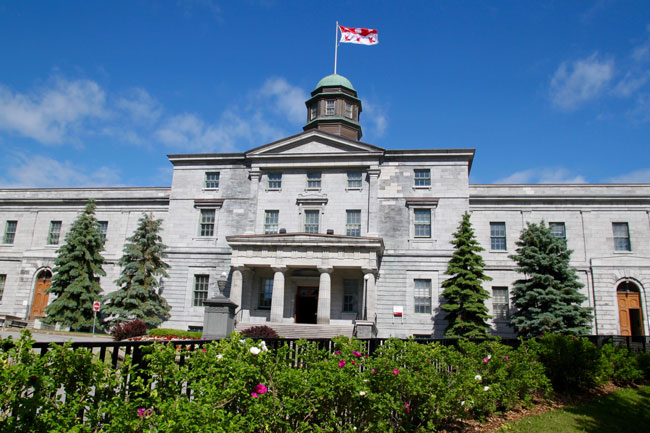Over recent months and years, sustainable development has become a pressing issue around the world. How can institutions, businesses and countries promote growth and economic development without depleting our finite natural resources?
McGill is no exception and, during the last week of September, members of the community will have the opportunity to join a three-day, University wide discussion on the subject that could shape the future of our institution.
To be held on Sept. 23, 28 and 30, the Open Forum on the Recommendations of the 2016 CAMSR Report on Divestment will seek input on two key topics related to sustainable development:
- creating a “comprehensive climate action plan” to reduce McGill’s carbon footprint while expanding initiatives in sustainability research and education; and
- developing concrete measures to ensure our investments comply with recognized Environmental, Social and Governance principles.
“Unlike a Town Hall [in which people are getting immediate answers to their questions], the Open Forum is primarily a listening exercise,” says Law professor Frédéric Bachand, Chair of the Open Forum. “We want as much input from as many people as possible. We want hear their priorities, their concerns and their ideas on how to improve sustainable development at McGill.”
In order to ensure maximum participation across McGill, two of the three sessions (Sept. 23 and 28) will be held downtown, while the Sept. 30 meeting will be held at Mac. Each one of the two-hour sessions will be live streamed. Participants who can’t make it in person, will be able to submit their suggestions live via email. The same email address can be used for submissions leading up to and immediately after the Open Forum. An online discussion board allows participants to get an early jump on the discussion.
“Of course, the public meetings are a key part of this exercise, but the Open Forum is a broader concept that includes written submissions,” says Sarah Berger Richardson, a PhD candidate in Law whom Bachand refers to as the Open Forum’s ‘co-chair.’ “In order for this to be effective, it has to be as inclusive as possible.”
Following the Open Forum, Bachand and Richardson will provide a written report summarizing views expressed in the discussions to the Provost no later than Oct. 31.
The seeds of the Open Forum were sewn back in February 2015, when Divest McGill asked that the University divest itself of investments in fossil fuel companies – primarily oil, gas and coal – on the grounds that fossil fuels are a leading source of climate change.
After a year of study and consideration, the Committee to Advise on Matters of Social Responsibility (CAMSR) submitted a report that did not recommend divestment at this point in time. Instead CAMSR proposed the University take a series of actions relating to, among things, investing in renewable and alternative energy; establishing a socially responsible investment fund option for donors; and developing and implementing environmental, social and governance principles and guidelines for endowment investments.
Soon after the CAMSR report, Principal Suzanne Fortier announced the University’s commitment to the Open Forum process as a means to engage members of the McGill community in helping shape future policy.
In an effort to make the upcoming discussions as fruitful as possible, the Open Forum website contains a host of background documents that will allow participants to get up to speed on such topics as sustainability research and education at McGill and the principles for responsible investment.
“Yes, we want to include as many people as possible in this discussion, but we also want to educate them so that they can have the most informed opinions possible,” says Bachand. “The feedback gathered in this report could influence future policy reforms, so it’s in everyone’s best interests to understand the issues.”
Open Forum dates:
Friday, Sept. 23
Time: 3 – 5 p.m.
Place: Maxwell Cohen Moot Court (room 100), New Chancellor Day Hall, Downtown campus
Wednesday, Sept. 28
Time: 2 – 4 p.m.
Place: Thomson House Ballroom, 3650 McTavish, Downtown campus
Friday, Sept. 30
Time: 10:30 a.m. – 12:30 p.m.
Place: Room MS2-022 (Faculty Lounge), Macdonald Stewart Building , Macdonald Campus
Visit the Open Forum website for more information, including background documents.
Join the online discussion forum.

